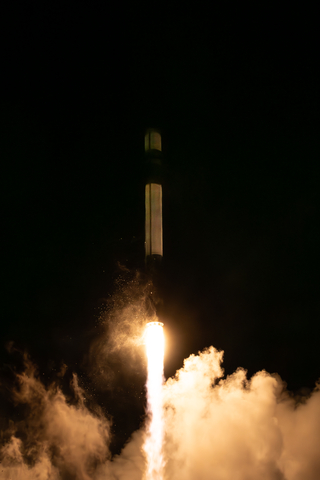Rocket Lab Sets Date for Second NASA PREFIRE Launch
Rocket Lab has announced the launch date for the second of two Electron launches for NASA's PREFIRE (Polar Radiant Energy in the Far-InfraRed Experiment) mission. The 'PREFIRE and Ice' launch is set for June 1, 2024, from Launch Complex 1 in Mahia, New Zealand, following the successful 'Ready, Aim, PREFIRE' launch on May 25, 2024. This mission will deploy two cube satellites to measure heat radiation from Earth's poles, aiding climate change predictions. Rocket Lab's rapid, precise launches are essential for the mission's success. 'PREFIRE and Ice' marks Rocket Lab's 49th Electron launch overall and seventh in 2024.
- Successful first launch on May 25, 2024, demonstrates reliability.
- Launch scheduled for June 1, 2024, ensuring mission continuity.
- Mission supports critical climate change research by NASA.
- Rocket Lab's ability to execute rapid, precise launches highlighted.
- 49th Electron launch overall showcases Rocket Lab's extensive experience.
- Seventh launch of 2024 indicates strong operational capability.
- Partnership with NASA boosts Rocket Lab's credibility and visibility.
- Potential risks if the second launch faces delays or failures.
- Dependence on precise timing increases operational pressure.
- No immediate financial data or revenue projections from the mission shared.
- details on long-term financial benefits for Rocket Lab.
Insights
Rocket Lab's announcement of the second NASA PREFIRE launch holds significant implications for both the company and the broader space industry. The most immediate impact is on Rocket Lab itself. Successfully executing back-to-back dedicated launches demonstrates operational efficiency and reliability, which are critical for securing future contracts. This capability strengthens Rocket Lab's competitive position against other small launch providers.
For stakeholders, particularly retail investors, it's essential to understand that this mission isn't just a routine task; it highlights Rocket Lab’s ability to cater to high-precision and time-sensitive mission requirements. This is a strong signal to the market about the firm's operational robustness and potential for revenue growth. Consistency in mission success also mitigates perceived risks associated with space launch ventures, enhancing investor confidence.
From a broader perspective, the PREFIRE mission addresses vital climate change research, adding a socially responsible dimension to Rocket Lab's portfolio. This aspect can attract ESG-conscious investors, potentially broadening the investor base. However, it's important to note that while successful mission execution boosts short-term investor sentiment, sustained financial performance will depend on continuous innovation and securing long-term contracts.
The PREFIRE mission's primary objective is to enhance our understanding of the Earth’s energy budget by measuring far-infrared radiation from the poles. This kind of data is currently underrepresented in climate models. For the scientific community, this is groundbreaking because it will improve predictions about ice melt, sea level rise and global weather patterns, which are critical for climate change mitigation strategies.
Investors should recognize the dual role of this mission: it not only advances scientific knowledge but also reinforces Rocket Lab’s role in supporting high-impact environmental research. However, while the societal benefits are immense, the direct financial implications for Rocket Lab might be less immediate unless this capability leads to more contracts focused on climate research satellites.
The launch is the second of two dedicated Electron launches for NASA’s PREFIRE mission to detect heat loss over the Arctic and

Rocket Lab's Electron rocket lift's off for NASA's first PREFIRE launch on May 25 2024. (Photo: Business Wire)
The ‘PREFIRE and Ice’ launch is scheduled to take place on 1 June NZST just seven days after the first PREFIRE launch, ‘Ready, Aim, PREFIRE,’ which successfully launched on May 25th, 2024. ‘PREFIRE and Ice’ will lift-off from Launch Complex 1 in Mahia,
NASA’s PREFIRE mission consists of two shoebox-size cube satellites that will measure the amount of heat Earth radiates into space from Earth’s poles. Data from the PREFIRE mission will help researchers better predict how Earth’s ice, seas, and weather will change in a warming world. At the heart of the PREFIRE mission is Earth’s energy budget – the balance between incoming heat energy from the Sun and the outgoing heat given off by the planet. The difference between the two is what determines the planet’s temperature and climate. A lot of the heat radiated from the Arctic and
Rocket Lab’s ability to launch dedicated missions to precise orbits in quick succession is critical to the success of PREFIRE. The mission requires two separate satellites to follow similar trajectories but along different paths to overlap with each other every few hours near the Arctic and
‘PREFIRE and Ice’ will be Rocket Lab’s 49th Electron launch overall and seventh launch of 2024.
Images and video: https://flic.kr/s/aHBqjBp4Cy
+ About Rocket Lab
Founded in 2006, Rocket Lab is an end-to-end space company with an established track record of mission success. We deliver reliable launch services, satellite manufacture, spacecraft components, and on-orbit management solutions that make it faster, easier, and more affordable to access space. Headquartered in
+ Forward Looking Statements
This press release contains forward-looking statements within the meaning of the Private Securities Litigation Reform Act of 1995. We intend such forward-looking statements to be covered by the safe harbor provisions for forward-looking statements contained in Section 27A of the Securities Act of 1933, as amended (the “Securities Act”) and Section 21E of the Securities Exchange Act of 1934, as amended (the “Exchange Act”). All statements contained in this press release other than statements of historical fact, including, without limitation, statements regarding our launch and space systems operations, launch schedule and window, safe and repeatable access to space, Neutron development, operational expansion and business strategy are forward-looking statements. The words “believe,” “may,” “will,” “estimate,” “potential,” “continue,” “anticipate,” “intend,” “expect,” “strategy,” “future,” “could,” “would,” “project,” “plan,” “target,” and similar expressions are intended to identify forward-looking statements, though not all forward-looking statements use these words or expressions. These statements are neither promises nor guarantees, but involve known and unknown risks, uncertainties and other important factors that may cause our actual results, performance or achievements to be materially different from any future results, performance or achievements expressed or implied by the forward-looking statements, including but not limited to the factors, risks and uncertainties included in our Annual Report on Form 10-K for the fiscal year ended December 31, 2023, as such factors may be updated from time to time in our other filings with the Securities and Exchange Commission (the “SEC”), accessible on the SEC’s website at www.sec.gov and the Investor Relations section of our website at www.rocketlabusa.com, which could cause our actual results to differ materially from those indicated by the forward-looking statements made in this press release. Any such forward-looking statements represent management’s estimates as of the date of this press release. While we may elect to update such forward-looking statements at some point in the future, we disclaim any obligation to do so, even if subsequent events cause our views to change.
View source version on businesswire.com: https://www.businesswire.com/news/home/20240529664488/en/
+ Rocket Lab Media Contact
Morgan Connaughton
media@rocketlabusa.com
Source: Rocket Lab USA, Inc.







